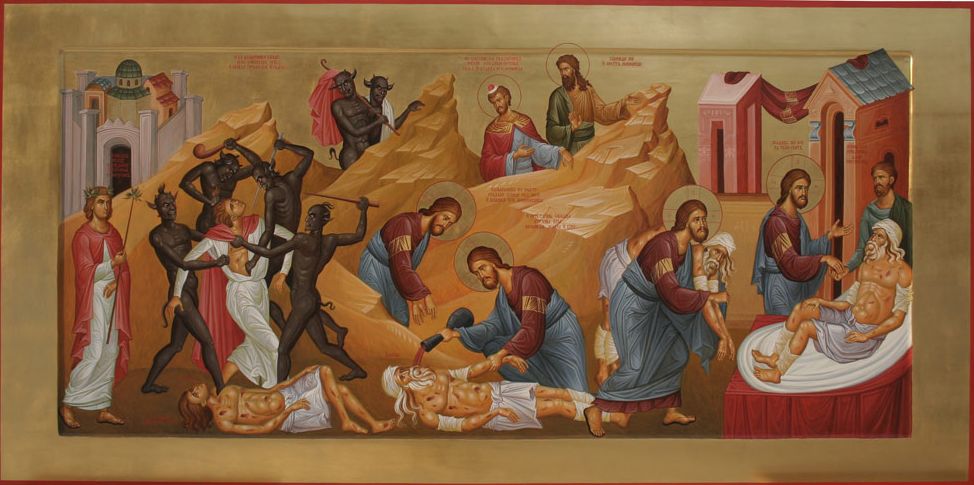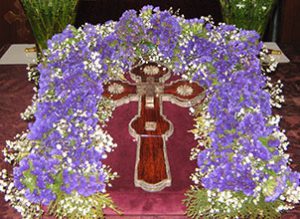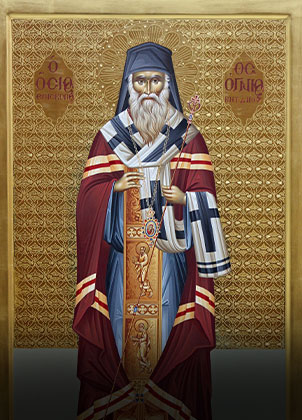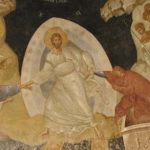Проповедь во вторую субботу Великого Поста
Во имя Отца и Сына и Св. Духа.
В апостольском чтении сегодня мы услышали строгие слова Ап. Павла: «Смотрите, братия, чтобы не было в ком из вас сердца лукавого и неверного, дабы вам не отступить от Бога живого». (Евр. 3,12)
Отчего же сердце человека наполняется неверием и отступает от Бога? От привязанности к земной жизни; оттого, что человек обращает все свое внимание на видимый мир и забывает о невидимом, вечном, духовном мире.
Господь Иисус Христос так показывает это в притче о званных на вечерю:
Царь устроил великолепный брачный пир для своего сына и пригласил многих, но приглашенные на пир стали один за другим отказываться. Один сослался на то, что он купил землю, другой извинялся тем, что женился. И каждый пошел кто на свою работу, кто на торговлю. Ради своих житейских занятий они пренебрегли Царской вечерей.
Под Царской вечерей можно понимать благодатную жизнь в Церкви Христовой, и в частности, служение Божественной литургии. В одной из священнических молитв литургии говорится: «Сотвори со входом нашим входу святых Ангелов быти, сослужащих нам». Т.е. вместе со священником, входящим в алтарь для служения литургии, с ним вместе входят и святые ангелы.
Однако, не им, а человеку, немощному и грешному, дано это великое достоинство, честь и блаженство предстоять перед алтарем и приносить бескровную жертву во спасение мира. Святой Иоанн Златоуст, на основании слов св. Ап. Петра (1 Пет. 1:12), говорит, что ангелы завидуют нам, людям, которым даровано счастье – вкушать Божественные Тело и Кровь, но сам человек, подчас, не слишком высоко ценит этот дар.
На страшном Суде Господь поставит по правую сторону тех, кто накормил голодного, напоил жаждущего, посетил больного, одел нагого. И напротив, Он осудит тех, кто имел возможность делать эти дела милосердия, но по своему жестокосердию, лености и равнодушию отвернулся от нужд своих ближних.
Великое достоинство священника проявляется также и в том, что он имеет возможность исполнять эти заповеди Господни в самом высшем, духовном смысле.
Потому что священник не телесный голод или жажду удовлетворяет, а преподает своим собратьям духовную пищу и питие – Тело и Кровь Христову в таинстве Евхаристии, он очищает их души в таинстве Покаяния, одевает их светлой, как снег, одеждой от воды и Духа в св. Крещении.
Никто другой не способен на это. Например, доброе дело – посетить больного. Но это совершенно несравнимо с тем, как если больного посетит священник и принесет ему Св. Таины. Для умирающего частица Пречистых Таин дороже всех сокровищ мира. Даже ангелы не могут оказать человеку такого благодеяния, не могут дать такого великого дара, как священник, хотя бы сам он был грешен и немощен.
Братья и сестры, наступило время испытания нашей веры. Это испытание может обернуться духовной катастрофой для тех, кто невнимателен; они охладеют к вере и отпадут от Бога. Поэтому нужно нам внимательно относиться к своей духовной жизни, к своему спасению, и в особенности сейчас во время поста. Великий Пост – это время духовных подвигов. Человек в духовном отношении никогда не стоит на одном месте. Он или продвигается вперед на лествице духовного восхождения, или скользит вниз.
Как говорит Апостол в сегодняшнем чтении: да не будет ни в ком из нас сердца неверного, чтобы нам не отпасть от Бога, но будем наставлять друг друга каждый день… Ибо мы сделались причастниками Христу, если только начатую жизнь твердо сохраним до конца.
Аминь
На заставке: притча о Добром Самарянине. Гостиничник из притчи изображает епископов и священников.
Sermon on the second Saturday of Great Lent
In the name of the Father and of the Son and of the Holy Spirit.
In the apostolic reading for today we have heard the stern words of St. Paul: “Watch out, brothers, so that there won’t be in any of you an evil, unbelieving heart that departs from the living God.” (Hebrews 3.12)
Why may it happen that a person’s heart becomes filled with unbelief and departs from God? It happens when one’s heart attaches to earthly life, when man’s all attention is attached to the visible world and he forgets about the invisible, eternal, spiritual world.
The Lord Jesus Christ shows this in the parable of the King’s wedding feast.
A king gave a magnificent wedding banquet for his son, and invited many, but those invited began to refuse one after another. One said that he had bought land, the other apologized that he had gotten married. And they went their ways, one to his work, another to his business. For the sake of their everyday activities, they neglected the King’s banquet.
The King’s Supper is interpreted as life of grace in the Church of Christ, and in particular, the Divine Liturgy. In one of the prayers of liturgy it’s said: “With our entry do Thou cause the entry of the Holy Angels, co-serving with us…” I.e., together with the priest, who enters the altar for serving liturgy, the holy angels also enter with him.
However, it is not to them, but to man, weak and sinful, has been granted this great dignity, honour, and blessedness to stand before the altar of God and offer a bloodless sacrifice for the salvation of the world. Saint John Chrysostom, based on the words of Holy Apostle Peter (1 Pet. 1:12), says that angels envy us, men, who are given this blessedness – to partake of Christ’s Body and Blood. However, men themselves often do not esteem this gift too highly.
At the Last Judgment, the Lord will put on His right those who filled the hungry, satisfied the thirsty, visited the sick, clothed the naked. And on the contrary, He will condemn those who were able to do these deeds of charity, but because of their indifference, hardness of heart and laziness, they neglected the needs of their brethren.
The great dignity of a priest is manifested also in the fact that he can fulfill these Lord’s commandments in the highest, spiritual sense. A priest can satisfy not one’s bodily hunger or thirst, but he provides for his fellow-Christians the spiritual food and drink – the Body and Blood of Christ in the sacrament of Eucharist; a priest can cleanse souls in the sacrament of Repentance, he clothes them in Holy Baptism with the white-as-snow garment from water and the Spirit.
No one else is capable of this. For example, visiting a sick person is a good deed. But it is incomparable with a priest’s visit when he brings the Holy Mysteries to a sick person. For a dying person, a particle of the Holy Mysteries is dearer than all treasures of the world. Angels cannot bring to a person these blessings, which a priest can bring, even though he himself may be an ordinary man, full of weaknesses.
Brothers and sisters, the time has come for our faith to be tested. This challenging time may cause a spiritual disaster for those who are inattentive to their salvation. They will grow cold in faith and fall away from God. Therefore, we need to be attentive to our spiritual life, especially now during Lent. Great Lent is a time of spiritual struggles.
Spiritually, a person never remains on the same level. He either moves forward on the ladder of spiritual ascent or slides down.
As the Apostle says in today’s reading: let none of us may have an unbelieving heart, so that we do not fall away from God, but let us instruct one another every day … For we have become partakers of Christ, if only we hold our original assurance firmly to the very end.
Amen.
On the header: the parable of the Good Samaritan. The inn keeper from the parable represents bishops and priests.









